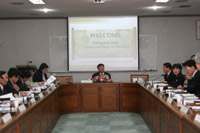Vietnam's Communist Party opens congress
Vietnam 's ruling Communist Party opened its congress Tuesday with a focus on tackling the deep-seated corruption that threatens economic growth even as the country reaffirms its commitment to market reforms. The congress, which runs through April 25, is also likely to see a shakeup in the top leadership with Prime Minister Phan Van Khai, 72, and President Tran Duc Luong, 68, widely expected to make way for younger leaders. It will also decide whether General Secretary Nong Duc Manh remains in his top post.

Held once every five years, the meeting allows the ruling party to chart the country's economic strategy. But a looming government corruption scandal has forced party leaders to turn their attention inward. "Intensifying the fight and control of corruption and wastefulness is a pressing requirement by the society and is the political determination of our party, with the aim of building a clean strong leadership and management apparatus," said Manh in his opening address to the 1,176 delegates.
By doing that, Vietnam can "overcome one of the major dangers that threaten the survival of our regime." This week, the delegates gathered at Ba Dinh Hall will be electing a new Central Committee of 160 members, which in turn will choose the Politburo, the party's innermost circle of leaders. For the first time ever, delegates will be allowed to nominate candidates for general secretary.
Manh emphasized that Vietnam will continue the economic reforms, initially launched two decades ago under the doi moi, or renovation, policy, that have turned the country into Southeast Asia's fastest growing nation. "The party affirms the continuation to comprehensively accelerate the renewal process, a policy that has won support from the people and highly appreciated by international opinion," Manh said.
Though Vietnam has done well, Manh noted that its growth is still "not on par with its capacity," and the country must work harder to ensure it does not fall behind its neighbors economically. He set a target of maintaining 7.5 percent to 8 percent annual growth over the next five years, cutting urban unemployment below 5 percent, and creating 8 million new jobs.
Though the capital's streets are draped in Communist hammer-and-sickle flags, Vietnam has been on a steady course from centrally planned economy toward a market economy. This year, Hanoi is pushing hard to join the World Trade Organization.
Last year, Vietnam recorded 8.4 percent economic growth its highest in a decade. And foreign investors have taken notice. Earlier this year, U.S.-based Intel Corp., the world's largest chipmaker, announced it would open a US$300 million testing and assembly plant in southern Ho Chi Minh City .
Dealing with widespread corruption in the political system may prove to be Hanoi 's biggest challenge now that its major ideological battles over the country's economic direction have been fought. "The degradation of the political, ideological, ethical, lifestyle of not a small number of cadres and party members, along with bureaucracy, corruption and wastefulness is serious," Manh said.
Though he did not directly address it, the widening scandal at the Transport Ministry was clearly at the center of Manh's remarks on corruption. The case allegedly involved millions in funds earmarked for infrastructure projects being siphoned off to pay for luxury cars and gambling on European soccer matches.
It has rocked the top levels of government, with Minister Dao Dinh Binh already forced to resign and several in his ministry placed under arrest. Though major corruption cases have been uncovered before, this one is proving to be an international embarrassment since much of the money was apparently development assistance given by the World Bank and Japan , among others, reports the AP.
N.U.
Subscribe to Pravda.Ru Telegram channel, Facebook, RSS!




